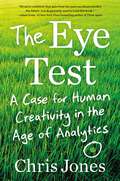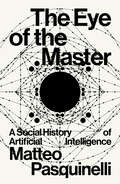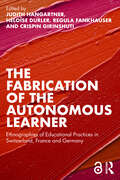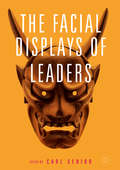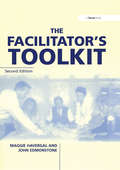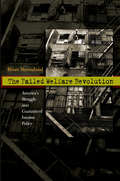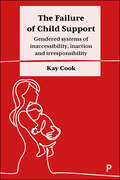- Table View
- List View
The Exvangelicals: Loving, Living, and Leaving the White Evangelical Church
by Sarah McCammonINSTANT NEW YORK TIMES BESTSELLER NATIONAL BESTSELLER"An intimate window into the world of American evangelicalism. Fellow exvangelicals will find McCammon’s story both startlingly familiar and immensely clarifying, while those looking in from the outside can find no better introduction to the subculture that has shaped the hopes and fears of millions of Americans." —Kristin Kobes Du Mez, New York Times bestselling author of Jesus and John Wayne The first definitive book that names the growing social movement of people leaving the church: the exvangelicals. Growing up in a deeply evangelical family in the Midwest in the ‘80s and ‘90s, Sarah McCammon was strictly taught to fear God, obey him, and not question the faith. Persistently worried that her gay grandfather would go to hell unless she could reach him, or that her Muslim friend would need to be converted, and that she, too, would go to hell if she did not believe fervently enough, McCammon was a rule-follower and—most of the time—a true believer. But through it all, she was increasingly plagued by fears and deep questions as the belief system she'd been carefully taught clashed with her expanding understanding of the outside world.After spending her early adult life striving to make sense of an unraveling worldview, by her 30s, she found herself face-to-face with it once again as she covered the Trump campaign for NPR, where she witnessed first-hand the power and influence that evangelical Christian beliefs held on the political right. Sarah also came to discover that she was not alone: she is among a rising generation of the children of evangelicalism who are growing up and fleeing the fold, who are thinking for themselves and deconstructing what feel like the “alternative facts” of their childhood.Rigorously reported and deeply personal, The Exvangelicals is the story of the people who make up this generational tipping point, including Sarah herself. Part memoir, part investigative journalism, this is the first definitive book that names and describes the post-evangelical movement: identifying its origins, telling the stories of its members, and examining its vast cultural, social, and political impact.
The Eye Test: A Case for Human Creativity in the Age of Analytics
by Chris JonesIn a world increasingly ruled by numbers and algorithms, award-winning journalist Chris Jones makes a compelling case for a more personal approach to analytical thinking. THE EYE TEST is a necessary course correction, a call for a more balanced, personal approach to problem-solving. Award-winning journalist Chris Jones makes the case for the human element—for what smart, practiced, devoted people can bring to situations that have proved resistant to analytics. Jones shares what he&’s learned from an army of extraordinary talents, including some of the best doctors, executives, athletes, meteorologists, magicians, designers, astrophysicists, and detectives in the world. There are lessons in their mastery.Of course, there is a place for numbers in decision-making. No baseball player should be judged by his jawline. But the analytics revolution sparked by Michael Lewis&’s Moneyball now threatens to replace one kind of absurdity with another. We have developed a blind faith in the machine, the way a driver overly reliant on his GPS might be led off the edge of a cliff. Not all statistical analysis is sound. Algorithms aren&’t infallible, and spreadsheets aren&’t testaments. Trust in them too much, and they risk becoming instruments of destruction rather than understanding.Worse, data&’s supremacy in our daily lives has led to a dangerous strain of anti-expertise: the belief that every problem is a math problem, and anyone given access to the right information will find the right answer. That taste doesn&’t matter, experience doesn&’t matter, creativity doesn&’t matter. That we can&’t believe our eyes, no matter how much they&’ve seen. THE EYE TEST serves as a reminder that if beauty is less of a virtue in the age of analytics, a good eye still is. This book is a celebration of our greatest beholders—and an absorbing, inspiring guide for how you might become one, too.
The Eye of Conscience: Photographers and Social Change
by Milton Meltzer Bernard ColePhotographs by noted photographers, past and present, and how photography has captured history and changed our existence.<P><P> Jane Addams Children’s Book Award Honor Book
The Eye of the Master: A Social History of Artificial Intelligence
by Matteo PasquinelliA social history of AI that finally reveals its roots in the spatial computation of industrial factories and the surveillance of collective behaviour.What is AI? A dominant view describes it as the quest "to solve intelligence," a solution supposedly to be found in the secret logic of the mind or in the deep physiology of the brain, such as in its complex neural networks.The Eye of the Master argues, to the contrary, that the inner code of AI is shaped not by the imitation of biological intelligence, but the intelligence of labour and social relations, as it is found in Babbage's "calculating engines" of the industrial age as well as in the recent algorithms for image recognition and surveillance.The idea that AI may one day become autonomous (or "sentient", as someone thought of Google's LaMDA) is pure fantasy. Computer algorithms have always imitated the form of social relations and the organisation of labour in their own inner structure and their purpose remains blind automation.The Eye of the Master urges a new literacy on AI for scientists, journalists and new generations of activists, who should recognise that the "mystery" of AI is just the automation of labour at the highest degree, not intelligence per se.
The Fable of the Mirrors: Network Society and Educational Reform
by Xie WeiheThis book examines the impact of network society on self-identity and education and proposes key tasks for transforming education in network society.Using the metaphor of the "mirror", the book describes the environment and changes in network society based on the internet and information technology. As the diversity and complexity of network society increases, people see more and more self-images in the large mirrors, leading to a variety of developmental orientations and self-identities, as well as more opportunities for objectification. However, this often leads to confusion as to which image in the mirror really represents oneself. This social framework, which forms the backdrop of modern education, poses new challenges for self-identity formation and educational development. The author emphasizes the role of education in constructing a new "mirror" that can lead children and young people to a better perception of themselves, and thus to self-identification and self-realization.The title will be of interest to scholars and students in the fields of educational theory and sociology of education, as well as general readers interested in topics related to network society, identity, and education.
The Fabric of Space
by Matthew GandyWater lies at the intersection of landscape and infrastructure, crossing between visible and invisible domains of urban space, in the tanks and buckets of the global South and the vast subterranean technological networks of the global North. In this book, Matthew Gandy considers the cultural and material significance of water through the experiences of six cities: Paris, Berlin, Lagos, Mumbai, Los Angeles, and London. Tracing the evolving relationships among modernity, nature, and the urban imagination, from different vantage points and through different periods, Gandy uses water as a lens through which to observe both the ambiguities and the limits of nature as conventionally understood. Gandy begins with the Parisian sewers of the nineteenth century, captured in the photographs of Nadar, and the reconstruction of subterranean Paris. He moves on to Weimar-era Berlin and its protection of public access to lakes for swimming, the culmination of efforts to reconnect the city with nature. He considers the threat of malaria in Lagos, where changing geopolitical circumstances led to large-scale swamp drainage in the 1940s. He shows how the dysfunctional water infrastructure of Mumbai offers a vivid expression of persistent social inequality in a postcolonial city. He explores the incongruous concrete landscapes of the Los Angeles River. Finally, Gandy uses the fictional scenario of a partially submerged London as the starting point for an investigation of the actual hydrological threats facing that city.
The Fabric of Space: Water, Modernity, and the Urban Imagination (The\mit Press Ser.)
by Matthew GandyA study of water at the intersection of landscape and infrastructure in Paris, Berlin, Lagos, Mumbai, Los Angeles, and London.Water lies at the intersection of landscape and infrastructure, crossing between visible and invisible domains of urban space, in the tanks and buckets of the global South and the vast subterranean technological networks of the global North. In this book, Matthew Gandy considers the cultural and material significance of water through the experiences of six cities: Paris, Berlin, Lagos, Mumbai, Los Angeles, and London. Tracing the evolving relationships among modernity, nature, and the urban imagination, from different vantage points and through different periods, Gandy uses water as a lens through which to observe both the ambiguities and the limits of nature as conventionally understood. Gandy begins with the Parisian sewers of the nineteenth century, captured in the photographs of Nadar, and the reconstruction of subterranean Paris. He moves on to Weimar-era Berlin and its protection of public access to lakes for swimming, the culmination of efforts to reconnect the city with nature. He considers the threat of malaria in Lagos, where changing geopolitical circumstances led to large-scale swamp drainage in the 1940s. He shows how the dysfunctional water infrastructure of Mumbai offers a vivid expression of persistent social inequality in a postcolonial city. He explores the incongruous concrete landscapes of the Los Angeles River. Finally, Gandy uses the fictional scenario of a partially submerged London as the starting point for an investigation of the actual hydrological threats facing that city.
The Fabrication of the Autonomous Learner: Ethnographies of Educational Practices in Switzerland, France and Germany
by Judith Hangartner Héloïse Durler Regula Fankhauser Crispin GirinshutiThis book provides a thorough and detailed analysis of how the figure of the ‘autonomous learner’ shapes educational practices. It unpacks the impact of current educational reform discourse that focuses on the individual pupil as a learner, while neglecting the social dimensions of classroom practices. In view of the yet unknown requirements of the knowledge economy, students are demanded to take more responsibility for their learning and to become self-reliant, independent, lifelong learners. In turn, teachers are asked to tailor education to the individual needs of their students and to foster their individual learning trajectories. Based on in-depth fieldwork and long-term observation of interactions in classrooms and other scholastic settings, scholars from three European countries – France, Germany and Switzerland – show how the translation of the figure of the ‘autonomous learner’ into classrooms is shaped by distinct cultural traditions. Chapters analyse teaching routines and conceptions of self-reliance involved in autonomy-oriented settings and discuss how these change the sociality of the classroom. They scrutinize how autonomy is used to differentiate between students and how it contributes to the reproduction of social inequality. The book brings into dialogue two neighbouring research traditions that research autonomous learning from a sociological perspective and which have largely ignored each other until now. In so doing, the contributions engage a critical perspective for a careful empirical analysis in order to better understand what is being done in the name of autonomy. Providing insight into the many facets of developing and nurturing self-standing pupils across various educational contexts, this is ideal reading for scholars in the field of education, as well as teachers and decision-makers across the educational sector.
The Face of Fashion: Cultural Studies in Fashion
by Jennifer CraikFirst Published in 2004. Routledge is an imprint of Taylor & Francis, an informa company.
The Face of Urbanization and Urban Poverty in Bangladesh: Explaining the Slum Development Initiatives in the light of Global Experiences
by Pranab Kumar PandayThe book presents academic research on urbanization, urban poverty and slum development initiatives in South Asia, in general, and Bangladesh, in particular, in the light of global slum upgrading initiatives. It combines the urban poverty and slum development initiatives globally and country-specific context in a single frame. The book identifies different dimensions of urban poverty, best practices of slum development initiatives, and challenges of the implementation of these programs so that the government and different development partners redesign their implementation strategies as regards to reducing the urban poverty and making improvement to the living conditions of the slum dwellers. The book provides a clear understanding of the penetrating procedures of different slum development initiatives in the global perspectives, following the operation procedure of different programs in Bangladesh. This allows the readers to make a comparison of the operating procedures of different programs.
The Face of the Firm: Corporate Hegemonic Masculinity at Work
by Michele Rene GregoryDespite decades of greater gender awareness at work in Western countries, gender inequality in the executive suites is alive and well. "The Face of the Firm" highlights new critical perspectives on the relationship between hegemonic masculine cultures, gender embodiment, and gender disparities in corporate organizations. Using data from over 100 interviews with female and male executives who worked for some of the most prestigious advertising and computer firms in the world, the book makes important connections between the empirical data and contemporary sexism in the United States and United Kingdom. The book refocuses the debate of executive work, organizational spaces, and gender inequality on gendered bodies at work. It also demonstrates that gendered and sexualized relations among executives often construct the production process. The book makes a contribution to masculinity, gender, and work scholarship and is organized along three key concepts: homogeneity, homosociability, and heterosexuality. These address such factors as the organizational locker room, sexual and heterosexual spaces at work, and the construction of women and men as different workers. This conceptual model is crucial for evaluating the mechanisms that support male dominance among highly skilled professionals and executives."
The Face of the Fox
by Frederick O. GearingIn The Face of the Fox, an anthropological and sociological study of the Fox American Indians (the Mesquakie, their actual tribal name) who live just outside Tama, Iowa, Frederick Gearing puts a face on the peoples of this tribe. In doing so, Gearing particularly deals with the estrangement of the Fox Indians and the Westerners surrounding them. He defines the concept of estrangement as including feelings of contempt, indifference, and pity often leading to misplaced hurt and hate on both sides. Specifically, he states that when one is estranged, he is unable to relate because he cannot see enough to relate to, which is a type of social disconnect. Estrangement shackles both parties, leaving them unable to connect with one another.Finding this is more of a cognitive mental processing problem, Gearing proposes gaining control of the mind, believing the opposite of being estranged is to find a people believable and real. The way to do this is to educate each estranged group about the other and put a face on each group. Educating Westerners about the Fox people they live next to, Gearing describes their community, their social structure, their culture, their language and some of its many meanings, and their view of themselves and how they view their future.Attempting to end estrangement and engender endearment and understanding, The Face of the Fox will be of interest to anthropologists and sociologists focusing on the American Indian.
The Facebook Narcissist: How to Identify and Protect Yourself and Your Loved Ones from Social Media Narcissism
by Lena DerhallyA comprehensive guide for understanding how narcissism on social media impacts our mental health, how to protect ourselves and our children from those affects as well as from narcissists, and how to use social media more mindfully.The Facebook Narcissist is the first book dedicated to exploring the relationship between narcissism and social media. Lena Derhally, a licensed psychotherapist certified in Imago therapy, delves into how social media enhances individual and cultural narcissism and how it may create or exacerbate toxic narcissistic tendencies in people who use it. Using her clinical expertise, along with scientific research and interviews with other experts in the field, she thoroughly examines: how narcissism on social media contributes to false narratives and ruptures relationships; how to identify a narcissist on social media (including how to spot the more subtle sub-types of narcissist, such as the covert, communal, and collective narcissist); how narcissism relates to the &“influencer&” and celebrity culture; narcissism and cyberbullying, cyberstalking, trolling, and victim blaming on social media; narcissism related to racism and politics on social media; the ways social media can create a problem of narcissism in children as they grow up, the implications of "sharenting"; and more. Readers will discover case studies and real examples of narcissists and how they present on social media. Derhally&’s expertise in cultivating healthy, fulfilling, and connected relationships helps guide readers to take a deeper look at their behaviors on social media and of those around them. At the end of each chapter, she gives practical tips and takeaways for navigating narcissism online. Since abandoning our devices is impractical and not likely, this book will help readers understand how to use social media in a balanced way that inspires fulfillment and connection instead of the entitlement, attention-seeking, and lack of empathy that is at the heart of narcissism. Derhally also instructs readers on how they may use social media for good, and as a tool for positive social change. Social media is here to stay, but with education and awareness on how it makes us and the world more narcissistic, we can change the narrative and focus on the ways in which social media can be positive, and even improve the world for the better.
The Faceless Terrorist: A Study of Critical Events in Tajikistan (Transcultural Research – Heidelberg Studies on Asia and Europe in a Global Context)
by Sophie RocheHow could a person portrayed as a terrorist by the Tajik state also be seen as a mujahid fighter in Islam and be a cousin all at the same time? Is this just a matter of perspective and conceptualization? To believe in the protection of concepts to safeguard groups and individuals from the uncertain character of the world, is to deny the existence of chance and the contradictions in life. This book uses approaches from existential anthropology to enquire into the question of how concepts and experiences relate. The focus is on the way the notions jihad, mujahid and terrorism were used during a military intervention in Tajikistan in 2010. The book includes long-term ethnographic material, popular pamphlets on Islam and an internet analysis of the conflict, offering new insights into how concepts and experiences relate. Since the end of the Soviet Union, the people from the republic Tajikistan have struggled to find a place in the larger Muslim world, a painful process unfolding in relation to global events, discourses and politics. The primary readership for the book will come from academia and policy makers. The book presents novel material on a fascinating and highly important topic, the nature of ostensibly Islamist political violence against the state in Tajikistan. John Heathershaw
The Facial Displays of Leaders
by Carl SeniorThis book provides a multifaceted analysis of how the human face drives many of our most important social behaviors. People perceive the identities, genders, and attractiveness of others from the many different faces they see every day. There has been great deal of research on the psychology, neuropsychology and neuroscience of how these perceptions are formed. However the facial displays of leadership, with their almost ubiquitous role in our social lives, remain largely unexplored. Carl Senior argues that perhaps now more than ever, it is crucial to understand how facial displays communicate leadership abilities. This book brings together perspectives from a range of international experts across a variety of fields including social psychology, organisational sciences and the study of primates, with the aim to further our understanding of this fundamental social force. Scholars and professionals, as well as anyone interested in learning more about how the face is used to drive our perception of leadership, will find this book of great interest.
The Facilitator's Toolkit
by John Edmonstone Maggie HavergalMaggie Havergal and John Edmonstone's Facilitator's Toolkit provides your organization with a resource on which every manager can draw. The authors explain the basic skills of facilitation, how and when to use them (and not to use them). The main part of the manual then offers a Toolkit of almost 100 tools for facilitation; tools for organizing groups; tools for strategic thinking; tools for problem solving; diagnostic tools; tools for managing people, including other facilitators; tools for decision making; tools for planning; tools for managing conflict and dealing with problems, situations or people.
The Faerie Handbook: An Enchanting Compendium of Literature, Lore, Art, Recipes, and Projects (The Enchanted Library)
by Carolyn TurgeonThis exquisite anthology welcomes you into an enchanted realm rich with myth, mystery, romance, and abounding natural beauty.Gorgeous fine art and photographs, literature, essays, do-it-yourself projects, and recipes provide hours of reading, viewing, and dreaming pleasure along with a multitude of ideas for modern-day living and entertaining with a distrinctive fairy touch.
The Failed Welfare Revolution: America's Struggle over Guaranteed Income Policy
by Brian SteenslandToday the United States has one of the highest poverty rates among the world's rich industrial democracies. The Failed Welfare Revolution shows us that things might have turned out differently. During the 1960s and 1970s, policymakers in three presidential administrations tried to replace the nation's existing welfare system with a revolutionary program to guarantee Americans basic economic security. Surprisingly from today's vantage point, guaranteed income plans received broad bipartisan support in the 1960s. One proposal, President Nixon's Family Assistance Plan, nearly passed into law in the 1970s, and President Carter advanced a similar bill a few years later. The failure of these proposals marked the federal government's last direct effort to alleviate poverty among the least advantaged and, ironically, sowed the seeds of conservative welfare reform strategies under President Reagan and beyond. This episode has largely vanished from America's collective memory. Here, Brian Steensland tells the whole story for the first time--from why such an unlikely policy idea first developed to the factors that sealed its fate. His account, based on extensive original research in presidential archives, draws on mainstream social science perspectives that emphasize the influence of powerful stakeholder groups and policymaking institutions. But Steensland also shows that some of the most potent obstacles to guaranteed income plans were cultural. Most centrally, by challenging Americans' longstanding distinction between the "deserving" and "undeserving" poor, the plans threatened the nation's cultural, political, and economic status quo.
The Failure of Child Support: Gendered Systems of Inaccessibility, Inaction and Irresponsibility
by Kay CookDrawing on interviews with informants from a diverse range of 16 countries, including the US, the UK, Germany, Portugal, Norway, Peru, Japan, South Korea, Malaysia and Nigeria, this book examines how child support systems often fail to transfer payments from separated fathers to mothers and their children. It lays out how these systems are structured in ways that render them ineffective, while positioning women as responsible for their failures. The book charts the demise of child support as a feminist intervention, resituating it as gendered governance practice that operates by making the system inaccessible, failing to deliver outcomes, and condoning fathers’ irresponsibility. It identifies how the gender order is entrenched through child support failure and offers possibilities for feminist reform.
The Failure of Italian Nationhood
by Manlio GrazianoThis book provides a political, economic, sociological, and cultural history of Italy that looks at its difficulties with the task of nation-building.
The Failure of Land Reform in Twentieth-Century England: The Triumph of Private Property
by Michael TichelarBased on a mixture of primary historical research and secondary sources, this book explores the reasons for the failure of the state in England during the twentieth century to regulate, tax, and control the market in land for the common or public good. It is maintained that this created the circumstances in which private property relationships had triumphed by the end of the century. Explaining a complex field of legislation and policy in accessible terms, the book concludes by asking what type of land reform might be relevant in the twenty-first century to address the current housing crisis, which seen in its widest context, has become the new land question of the modern era.
The Failure of Political Reform in Venezuela (Routledge Revivals Ser.)
by Julia BuxtonThis title was first published in 2001. The victory of former lieutenant colonel Hugo Chavez in the Venezuelan presidential elections of 1998 was criticized as a blow against the country's deep-seated democratic tradition. It is claimed that this simplistic argument fails to recognize the extent of democratic deterioration in the country and the limitations imposed by discredited political actors on a meaningful democratic reform process. The book aims to break new ground in providing unseen evidence of electoral fraud and offers a fresh perspective on the nature of democratic development.
The Failure of Political Reform in Venezuela (Routledge Revivals)
by Julia BuxtonThis title was first published in 2001.The victory of former lieutenant colonel Hugo Chavez in the Venezuelan presidential elections of 1998 was criticized as a blow against the country's deep-seated democratic tradition. It is claimed that this simplistic argument fails to recognize the extent of democratic deterioration in the country and the limitations imposed by discredited political actors on a meaningful democratic reform process. The book aims to break new ground in providing unseen evidence of electoral fraud and offers a fresh perspective on the nature of democratic development.
The Fair Reader: An Extra! Review Of Press And Politics In The '90s
by Jim Naureckas Janine JacksonWhy did major news outlets virtually ignore the only cost-effective plan for universal health care coverage—even though polls showed the plan had majority support? Why did leading journalists go out of their way to attack Bill Clinton’s rivals in the 1992 Democratic primary—while focusing unprecedented attention on Clinton’s personal life? Why do establishment media consider falling unemployment to be bad news? In the tradition of I.F. Stone and George Seldes, the contributors to The FAIR Reader probe the often mysterious connections between press and politics in the 1990s. The essays are filled with startling information about the critical issues of our time—from the Gulf War and the Clarence Thomas hearings to the debates over health care reform and NAFTA—documenting the deceptive, one-sided mainstream reporting that leaves the public in the dark. Particular attention is paid to the election of 1992 and the Clinton administration, showing how the media promoted, undercut, and finally shaped Clinton to fit a media agenda, the book demonstrates that systematic media bias poses a threat to the democratic process and the free flow of information to the U.S. citizenry. FAIR, founded in 1986, is the national media watch group dedicated to the principle that independent, aggressive, and critical media are essential to an informed democracy. In the nine years since FAIR was launched, it has gained national recognition for its well-documented studies of media bias, its challenge to powerful media figures like Rush Limbaugh, and its award-winning journal of media criticism and politics, Extra!. The FAIR Reader collects Extra!’s most incisive reporting on journalism and politics in the ‘90s. It will be invaluable to anyone interested in decoding the media agenda behind the daily news.
The Faith Instinct
by Nicholas WadeNoted science writer Nicholas Wade offers for the first time a convincing case based on a broad range of scientific evidence for the evolutionary basis of religion. .

